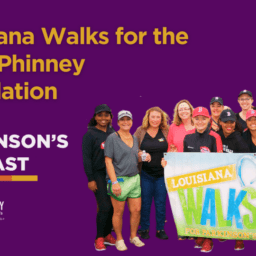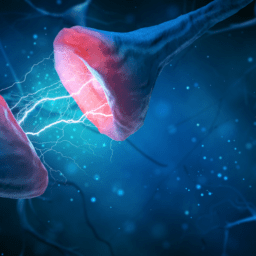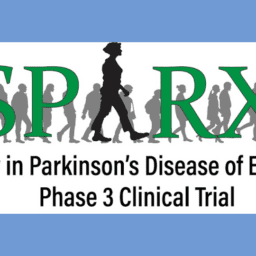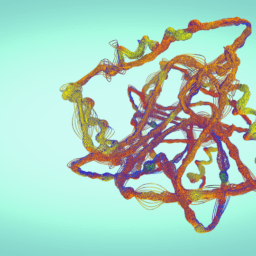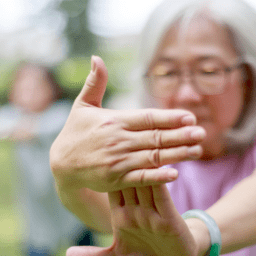This month’s “What’s New in Parkinson’s” post includes a special year-end recap of ten important news highlights from 2023.
Ten Important Parkinson’s Topics from 2023
- In May, a team of researchers reported that they can identify people with Parkinson’s using a fluid sample to identify misfolded alpha-synuclein, a hallmark of Parkinson’s pathophysiology. This report represents the first confirmed fluid-based biomarker for Parkinson’s. While there is ongoing discussion and much to learn, many consider this a pivotal moment in Parkinson’s research.
- In July, thousands traveled to Barcelona, Spain for the sixth World Parkinson Congress. This congress convenes people from all parts of the Parkinson’s community to learn, build community, and strategize.
- Earlier in December, the US House of Representatives passed the National Plan to End Parkinson’s Act. If the act passes the Senate, this legislation would coordinate resources to improve quality of life for people with Parkinson’s and accelerate efforts to develop treatments and, ultimately, a cure.
- Chemicals and pesticides also received a lot of attention this year. Researchers found association between air pollution and Parkinson’s mortality. The EPA proposed banning TCE, a chemical associated with Parkinson’s, and the US Department of Veterans Affairs expanded coverage for those people affected by TCE exposure at Camp Lejune. A lawsuit moved forward against the manufacturer of Paraquat: a pesticide associated with Parkinson’s.
- Throughout the year, there were valuable and important developments that focused on Parkinson’s in Africa. For example, researchers reported on discovery of a new genetic risk factor for Parkinson’s in people of African descent. A short documentary about Parkinson’s in Kenya, Shaking Hands with the Devil, received substantial press and accolades. Further, a team of researchers and advocates launched Transforming Parkinson’s Care in Africa, a research grant aimed at improving understanding of the state of Parkinson’s in seven African nations.
- Multiple 2023 articles centered on sex-specific differences in Parkinson’s and the experience of women with Parkinson’s, including this article from November and this one from June. Also, in October, researchers presented that “the abrupt reduction of estrogen levels during the perimenstrual period may contribute to reduced responsiveness to dopaminergic treatment during menses.” Researchers also reported in October that an estrogen receptor agonist has been found to have neuroprotective potential in models of Parkinson’s. More information about this research is available here. Finally, a group of women living with Parkinson’s published a book: In Her Shoes.
- French researchers published further evidence associating exercise with decreased incidence of Parkinson’s. They examined health records of thousands of French women and found that those who exercised more had lower likelihood of developing Parkinson’s.
- In October, researchers wrote that Tai Chi may slow Parkinson’s progression. Over the course of a three-year study, they found that two hour-long sessions of Tai Chi each week slowed progression of Parkinson’s.
- Also in October, a new form of continuous infusion levodopa was approved for some people with Parkinson’s in England. This new formulation has been developed for continuous, subcutaneous infusion and has shown to reduce OFF times.
- A small percentage of people with Parkinson’s receive specialist care in the US. A study of Parkinson’s care access in the United States found a number of alarming data points.
Read on for the rest of December’s Parkinson’s news!
SCIENCE AND RESEARCH Updates
- Levodopa has short term and long term effects on bradykinesia, and researchers in Michigan recently investigated the relationship between short term response, long term response, and external motivation. The slow movements associated with bradykinesia had been thought to represent compensation for increased movement variability in people with Parkinson’s, but more recently, researchers have theorized that bradykinesia relates to motivation, which is influenced by dopamine levels. This research continues to explore these different perspectives on bradykinesia.
- Researchers report on the influence of exercise on glutamate function in neuropsychiatric disorders. Safinamide is a Parkinson’s medication thought to influence glutamate neurotransmission.
- The dopamine system of the basal ganglia receives a lot of attention in treating Parkinson’s. Researchers recently published their findings that differences in symptom severity cannot be explained only by basal ganglia function. They note that the premotor cortex is more active in people with mild motor symptoms than in people with greater symptom severity.
- Brain Communications published an article examining the relationship between cognitive function and gait abnormalities in Parkinson’s. The researchers evaluated brain scans and found “when encountering an obstacle on the floor, participants with Parkinson’s disease exhibited deficits in both proactive and reactive control mechanisms.” Because participants were on stable dopamine therapy during the trial, the research team noted that “cognitive impairment was not directly related to dopaminergic depletion.”
- Swanaker et al.’s PD-EASE study concluded that “exercises are efficacious in improving mentation, ADL, and motor symptoms in early-stage Parkinson’s;” the effect is independent of levodopa; and positive effects were not fully present until after 12 weeks of exercise.
- More evidence of exercise’s benefits: The PD Warrior program improves motor outcomes and quality of life for people with Parkinson’s.
- Diagnostic support: Researchers report that, compared with people living with Parkinson’s, people with functional parkinsonism are more likely to have asymmetry in arm swing while walking, more likely to have normal passive arm swing, and less likely to improve arm swing while running. Assessing arm swing may be a means of differentiating between functional parkinsonism and Parkinson’s.
- The full report on the PRISM-PD study has been released in Lancet Neurology.
- The “Pants-sign” is when people only put pants on while sitting: The Pants-sign predicts future falls. Importantly, this sign is not predictive for people who have not yet fallen.
- An editorial in Journal of Parkinson’s Disease argues that pesticide exposure increases risk of Parkinson’s by altering gut microbiome.
- A research report in Movement Disorders highlights the results of an open-label extension of a trial for IPX203, a new formulation of extended release carbidopa-levodopa.
- Shan et al. argue for the need to phase out use of toxins associated with Parkinson’s and for improved screening for exposure to these toxins.
- An article in Movement Disorders examines reasons to incorporate input from people with Parkinson’s into the design of disease-modifying trials. The authors discuss shortcomings of typical rating scales used in evaluating efficacy of a treatment.
- Researchers are increasingly developing trials that aim to prevent Parkinson’s for people known to be at high risk of developing the disease. An article written by multiple people with Parkinson’s and people who are at high risk of developing Parkinson’s highlights reasons to incorporate perspectives of people in these groups when designing preventative trials.
- A new device to help improve gait disturbance is being researched in the UK. The device is worn on the calf muscles and uses vibrational cues to help augment gait.
- For many years, genetic and environmental factors have been thought to influence a person’s likelihood of developing Parkinson’s. New research confirms that a person’s genetic risk factors and environmental factors– including type 2 diabetes, body mass index, tobacco use, and physical activity levels–can influence a person’s likelihood of developing Parkinson’s.
- An article from UCLA Health highlights ways to improve delivery of Parkinson’s diagnoses.
LIVING WELL STORIES
- Matthew Moore, who was diagnosed with Parkinson’s in 2019, has written a play about Parkinson’s and has been producing parody songs about Parkinson’s, including a parody of “You’re a Mean One, Mr. Grinch.”
- Tincy Jose works in urgent care in a hospital. It took her more than a year to share her Parkinson’s diagnosis with her colleagues, but she continues to thrive after diagnosis, including advocating to improve Parkinson’s care in hospitals.
- Vikas Chinnan, whose fundraising efforts we featured in June, continues to fundraise to help improve life for people with Parkinson’s. He recently led a fundraiser through Ping Pong for Good.
- Tommy Melli was diagnosed with Parkinson’s six years ago; now, he is preparing to climb the highest mountain outside of Asia.
- Parkinson’s altered Tony Marchese’s ability to speak, walk, and play his violin. He lately surprised members of his care team with a lunchtime violin serenade.
- “Parkinson’s ON” is an app designed by Kuhan Pushparatnam, who lives with Parkinson’s. The app aims to help track medication timing, physical activity, and other aspects of self care.
SURVEYS, CLINICAL TRIALS, AND VOLUNTEER OPPORTUNITIES
- Zydus Lifesciences received approval to begin a phase II trial of an NLRP3 inhibitor for people with Parkinson’s. NLRP3 inhibition is thought to work against neuroinflammation.
- The Journal of Parkinson’s Disease published an article describing the philosophy and function of the international Linked Clinical Trials initiative.
- Researchers in the UK and Australia began recruiting participants for a trial aiming to prevent people with REM sleep behavior disorder from developing Parkinson’s by reducing inflammation.
- Researchers in Sweden will begin recruiting participants for a trial of montelukast versafilm: a drug used to treat asthma and allergies. The research will explore whether montelukast has any neuroprotective effect.
- Texas Tech in Lubbock, Texas is undertaking a study about the effects of Parkinson’s on family functioning.
- Researchers in Holland are enrolling participants in a trial evaluating the use of motivational smartphone apps to increase exercise program adherence.
- Inhibikase is recruiting participants for a phase 2 trial of a new c-Abl tyrosine kinase inhibitor. In a press release, Inhibikase says their research “has validated the critical role that c-Abl plays in the initiation and progression of Parkinson’s disease, as well as the potential of IkT-148009 as a promising new approach to disease modification.” This trial is among the first to utilize recently validated alpha-synuclein seed assay tests.
- The International Parkinson and Movement Disorders Society (MDS) is developing a new electronic diary (e-Diary): a digital solution for Parkinson’s. This e-Diary is intended to better characterize how the disease affects daily life. The MDS invites people to participate in a survey to help aid the design of this new tool.
- A new trial studying Gemfibrozil, a drug that decreases fat production in the liver, is set for a phase two clinical trial in people with Parkinson’s. This trial will enroll people between 40 and 75 years of age who have not begun taking medication for Parkinson’s.
- The Speech Accessibility Project (SAP) seeks volunteers for a research initiative aiming to make voice recognition technology more useful for people with diverse speech patterns. More information is available here and here. To determine whether you are eligible to participate, visit the SAP registration page.
- A team of Dutch researchers created PregSpark, a registry for women with Parkinson’s who are pregnant or have recently given birth. The goal is to build an online international pregnancy and Parkinson’s registry. This registry will prospectively and uniformly collect data on the course and outcome of as many as possible pregnancies in women with Parkinson’s. This data will help women with Parkinson’s make informed decisions about pregnancy and improve the quality of care pregnant women with Parkinson’s receive. The PregSpark site is under construction.
- A phase 1b trial is recruiting volunteers for a study of a treatment aiming to influence inflammation.
- Researchers in Norway are investigating the efficacy of ambroxol in people with dementia with Lewy bodies.
- Researchers in the UK, in partnership with the Women’s Parkinson’s Project and MyMovesMatter, invite participation in a survey about the experience of menopause for women with Parkinson’s.
- Another study of ambroxol is launching: The DUPARG study is recruiting participants in Groningen, Netherlands.
- A new trial examining the possible neuroprotective effect of exercise has been listed by the University of Nevada.
- University of Rochester Center for Health + Technology is undertaking a survey study to assess the ability of the Parkinson’s Disease-Health Index to measure patient-relevant changes in disease burden over the course of two years. Participants will complete surveys five times over two years and must be over 18, speak English, and have a self-reported or clinical diagnosis of Parkinson’s. More information is available here.
- Researchers at Columbia University’s Irving Medical Center are seeking participants for a study exploring the role of immune response in Parkinson’s. Participation is open to those with and without Parkinson’s and will involve donating blood, a questionnaire, a cognitive test, and a neurological examination. Click here to express interest in participating.
- Johns Hopkins University has announced a trial to evaluate whether levetiracetam can improve symptoms of Parkinson’s psychosis. The trial is not yet recruiting, but the plan is for it to begin by September. The trial design features a crossover assignment, which means every participant will receive an active trial drug for their participation.
- The LUMA trial continues to recruit participants. This trial aims to assess the safety and efficacy of BIIB122 tablets in slowing the progression of early-stage Parkinson’s. This study has sites in the US, China, France, Germany, the Netherlands, Poland, Spain, and the UK.
- The ACTIVATE trial is recruiting participants for a phase 2 trial of BIA 28-6156 in people with GBA mutations. This 78-week trial has site locations in the US, Canada, and Europe.
- In Colorado, a study the Foundation is funding continues to recruit participants. The study explores low-load resistance training with blood flow restriction to help develop exercise interventions for improved quality of life for people with advanced Parkinson’s.
- Washington University School of Medicine is sponsoring a study aiming to enroll participants with idiopathic REM sleep behavior disorder, as well as healthy controls, in preparation for a trial of neuroprotective treatments against synucleinopathies.
- A study in South Carolina hopes to identify brain biomarkers to predict the risk of cognitive change following DBS surgery.
- A survey in Ireland seeks to understand the influence of Parkinson’s symptoms and other factors on the quality of life.
- Another survey for those in Ireland seeks to understand how people access information about Parkinson’s.
- A trial sponsored by the University of Aberdeen in Scotland is recruiting participants for a study of the effects of constipation and changes in the microbiota in Parkinson’s.
- Staying Connected through Communication Study: The University of Washington SPEAC Lab invites individuals living with Parkinson’s to answer survey questions about their communication experiences. This is an online survey study that will take about 30-45 minutes. (Paper surveys are also available.) People with Parkinson’s and their family/friends/coworkers will complete SEPARATE surveys, and data are not shared between participants. This study is open to anyone in the US. Participants will be mailed a $25 check upon survey completion.
- PreActive PD Study: This study, available for both English and Spanish speakers, implements an occupational-therapist-delivered physical activity behavior change coaching intervention in people with early-stage Parkinson’s. The study is based upon a recent single-arm cohort feasibility study (Pre-Activate PD/HD) that evaluated acceptability, implementation, and resulting effect estimates of the Pre-Activate PD intervention in 13 participants. The intervention provides one-on-one coaching sessions from an occupational therapist to individuals newly diagnosed with Parkinson’s. The individualized structured support in the sessions is aimed at facilitating and optimizing exercise uptake as part of an effective self-management program.
- Gamma Wave Trial: Sponsored by the Massachusetts Institute of Technology (MIT), this trial investigates the efficacy of a non-invasive method of neuromodulation called Gamma Entrainment Using Sensory Stimulation (GENUS) for managing Parkinson’s motor symptoms. GENUS is administered via light, sound, and tactile stimulation devices and has been tested on cognitively normal individuals and individuals with mild Alzheimer’s; the device was found to be safe for use and effective for entrainment in both populations.
- Deep Brain Stimulation (DBS) and Exercise Study at Barrow Neurological Institute: This study aims to help researchers learn more about how aerobic exercise affects symptoms of Parkinson’s and the quality of life in people who have DBS. They will also look at brain wave activity using the Medtronic Percept DBS device to better understand what changes in the brain might be caused by exercise and how that affects Parkinson’s symptoms. Phoenix-area residents reach out to Markey if interested.
- Colorado Oral Strengthening Device: The University of Colorado Denver is looking for adults with Parkinson’s to participate in a study exploring how a novel low-technology device can increase tongue strength comparable to standard-of-care exercise using tongue depressors but with the kinematics and simple biofeedback of existing high-cost devices. Research has shown that tongue resistance exercises paired with biofeedback result in improved tongue strength to support chewing, control of food and liquid in the mouth, and propulsion of material for a swallow.
- PD GENEration: The Parkinson’s Foundation announces a major expansion of its national study to make genetic testing and counseling more available for people with Parkinson’s. The study (NCT04057794) hopes to enroll 15,000 people in all 50 US states, Puerto Rico, and the Dominican Republic. For questions about enrollment, email genetics@parkinson.org. Know someone who speaks Spanish and wants to learn more and maybe participate in the study? Share this link.
- Parkinson’s Progression Markers Initiative: In an expanded study, the Parkinson’s Progression Markers Initiative (PPMI) is currently working to enroll up to 100,000 people with and without Parkinson’s. The study team is especially seeking to enroll people diagnosed with Parkinson’s in the past two years and who are not yet on treatment, as well as people 60 and older who aren’t living with Parkinson’s but have a risk factor for it (such as a close relative with Parkinson’s, a known Parkinson’s-associated mutation, and/or REM sleep behavior disorder). The observational study is also enrolling people with no known connection to Parkinson’s to serve as a control group.
- TOPAZ (Trial of Parkinson’s and Zoledronic Acid): Caroline Tanner, MD, PhD, is recruiting participants for a new remote clinical trial led by a team of Parkinson’s experts at UCSF in partnership with researchers from across the country. The study aims to help people with Parkinson’s or parkinsonism maintain their independence by reducing the risk of hip fractures. The study will test if zoledronate, an FDA-approved medication for osteoporosis, can prevent fractures in people with Parkinson’s–whether or not they have osteoporosis. To learn more, visit the study website at TOPAZstudy.org, email TOPAZ@ucsf.edu, or call (415) 317-5748.
- A PD Avengers research group is undertaking a new project called Sparks of Experience, designed to be more systematic about collecting and considering the experiences and ideas that come from the curious minds of people living with Parkinson’s. “In the past, these sometimes quirky ideas inspired by lived experience have turned into significant new directions for research. It could be said we are trying to capture serendipity,” the team says. To learn more and get involved, see the flyer here.
- Game-Based Exercise Project: Researchers at the University of Auckland are investigating how games can be used as potential rehabilitation systems. This project aims to develop suitable game-based exercise experiences to help people living with Parkinson’s. If you are 45 or older, living with a chronic condition such as Parkinson’s, and/or are experiencing age-related health conditions, you are invited to participate in a survey that will help the researchers to understand the community’s interest in games and gameplay in the context of exercise and rehabilitation. To learn more and take the 15-minute survey, see the flyer here.
- SPARX3 – A Phase 3 Clinical Trial about Exercise and Parkinson’s: This research team is currently seeking volunteers to participate in a clinical trial about the effects of aerobic exercise on people with Parkinson’s. Learn more and see if you qualify here. For more details, contact Katherine Balfany at SPARX3@ucdenver.edu.
- The University of Oulu and collaborators from Aalborg University, Fraunhofer University, the University of Manchester, the University of Glasgow, the University of Lisbon, and the University of Melbourne are conducting a survey for people with Parkinson’s and care partners about self-care. Complete the survey here to share your self-care strategies and techniques. You can also review ideas submitted by others and add them to your own self-care toolbox.
- Speech and Telemedicine Study: The Purdue Motor Speech Lab
- Parkinson’s and Service Dogs: University of Groningen, Netherlands
- Neurology Study Interest Registry: University of Rochester
For more of what’s new in Parkinson’s news, check out our full series here.
WANT MORE PRACTICAL ARTICLES LIKE THIS?
You can learn much more about living well with Parkinson’s today through our Every Victory Counts® suite of resources. Each manual is packed with up-to-date information about everything Parkinson’s. Click the link below to order your manual(s).





